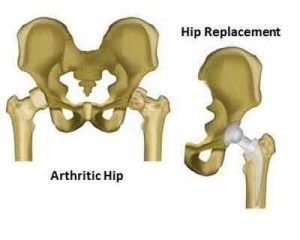- Home
- Editorial
- News
- Practice Guidelines
- Anesthesiology Guidelines
- Cancer Guidelines
- Cardiac Sciences Guidelines
- Critical Care Guidelines
- Dentistry Guidelines
- Dermatology Guidelines
- Diabetes and Endo Guidelines
- Diagnostics Guidelines
- ENT Guidelines
- Featured Practice Guidelines
- Gastroenterology Guidelines
- Geriatrics Guidelines
- Medicine Guidelines
- Nephrology Guidelines
- Neurosciences Guidelines
- Obs and Gynae Guidelines
- Ophthalmology Guidelines
- Orthopaedics Guidelines
- Paediatrics Guidelines
- Psychiatry Guidelines
- Pulmonology Guidelines
- Radiology Guidelines
- Surgery Guidelines
- Urology Guidelines
Outcomes of Hip replacement surgery different for men and women: Study

Outcomes such as pain, function, range of motion, and strength after total hip arthroplasty, or joint replacement surgery, are different for men and women, which could lead to the development of sex-specific rehabilitation programs, according to new research findings presented this week at the 2016 ACR/ARHP Annual Meeting in Washington.
Osteoarthritis, or OA, is the most common joint disease affecting middle-age and older people. It is characterized by progressive degenerative changes involving the joint cartilage -- the cushioning material at the end of long bones -- among other structures around the joint. Total hip arthroplasty (THA) often is used to treat patients with hip OA.
Researchers at the University of Illinois at Chicago studied 124 individuals before and one year after total hip arthroplasty. The subjects had an average age of 61 and an average body-mass index of 29, and 64 were female. They analyzed the patients' walking mechanics using gait analysis, hip abductor strength through manual muscle testing, and function and pain using the Harris Hip Score survey. The researchers looked for statistical relationships between improvements in pain and function scores, and improvements in walking mechanics and muscle strength. Men and women were analyzed separately, and the results were compared.
The researchers wanted to get to the bottom of why women and men fare differently after hip replacement surgery.
"Over the last five to 10 years, an increasing number of studies have suggested that women are at risk for poorer outcomes from total hip and knee replacement. There are many factors at play, and people are tackling this problem from many angles," said Kharma C. Foucher, PhD, Assistant Professor of Kinesiology and Nutrition at UIC and the study's senior author. "As a biomechanics researcher, I wanted to know whether or not any of the biomechanical differences between men and women could be coming into play."
Their analysis showed that the biomechanical factors associated with pain and function improvements were different in men and women. Women who reported better functional recovery (for example, ability to walk without a limp or put on socks and shoes with no difficulty) had more abductor strength improvement and better abductor function during walking. They did not see these associations in men, but a few gait variables were associated with pain relief. The study was a secondary analysis of data previously collected by Dr. Foucher at Rush University in Chicago.
The study's results suggest that tailoring rehabilitation to each sex might help patients have better outcomes after surgery, the authors said.
"We found that pre- to post-op changes in pain and function have different impact on abductor strength and gait mechanics in men and women," says Dr. Foucher. The finding that was most interesting was that hip abductor strength and function were associated with improved, self-reported function in women, but not men, she said. "It's very important to note that we can't determine cause and effect from this study design. But this is a hint that perhaps rehabilitation priorities should be different in men and women. It is possible that more focus on hip abductor strengthening will improve function in women, but may not be as critical in men. More studies are needed to establish cause and effect before we can make clinical recommendations."
Dr. Foucher and her colleagues would like to do follow-up prospective studies to try to replicate and expand on these findings for deeper understanding of why men and women have different post-surgical outcomes.
"The long-term goal is to see whether or not we can use this knowledge to help improve surgical planning or rehabilitation," she said. "We see this work as complementing other researchers' efforts to develop decision aids, prediction tools, and patient education to reduce disparities and improve care for both men and women."

Disclaimer: This site is primarily intended for healthcare professionals. Any content/information on this website does not replace the advice of medical and/or health professionals and should not be construed as medical/diagnostic advice/endorsement or prescription. Use of this site is subject to our terms of use, privacy policy, advertisement policy. © 2020 Minerva Medical Treatment Pvt Ltd